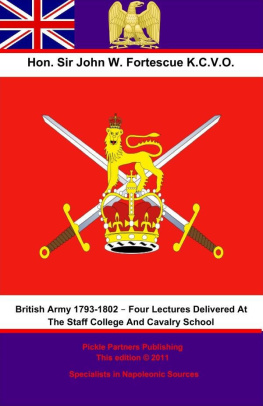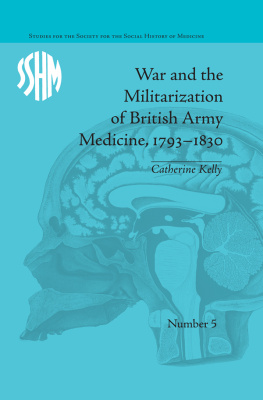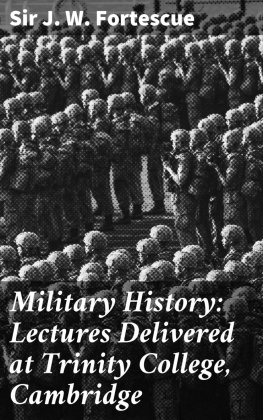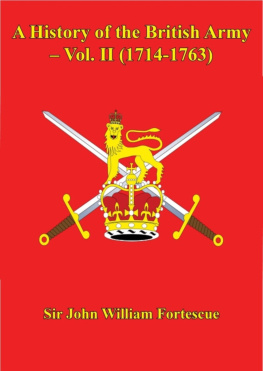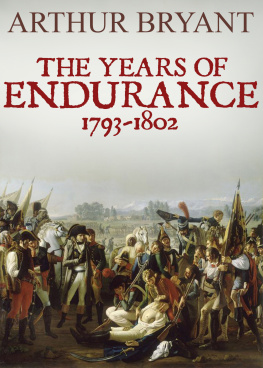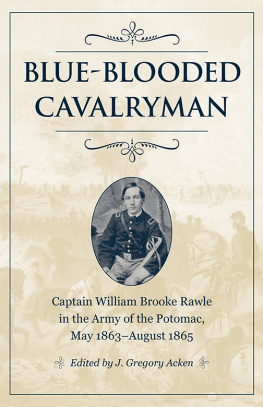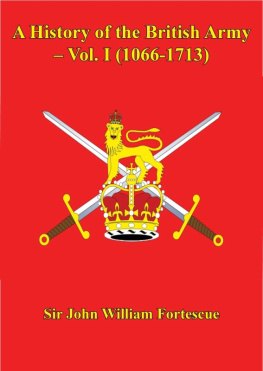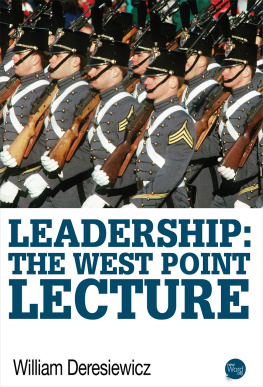The British Army
1783-1802
FOUR LECTURES
DELIVERED AT THE STAFF COLLEGE AND CAVALRY SCHOOL
BY
THE HON. J. W. FORTESCUE .
This edition is published by PICKLE PARTNERS PUBLISHING
Text originally published in 1905 under the same title.
Pickle Partners Publishing 2011, all rights reserved. No part of this publication may be reproduced, stored in a retrieval system or transmitted by any means, electrical, mechanical or otherwise without the written permission of the copyright holder.
Publishers Note
Although in most cases we have retained the Authors original spelling and grammar to authentically reproduce the work of the Author and the original intent of such material, some additional notes and clarifications have been added for the modern readers benefit.
PREFACE
THE four lectures comprised within this volume have been printed at the request of some of the officers or the Staff College and Cavalry School, to whom they were delivered in November 1904. Though, from the nature of the subject, there is some repetition in the third and fourth lectures of matter brought forward in the two first, I have decided to print the whole of them as they stand. There may well be young officers who would find the lectures addressed to so critical an audience as the Staff College somewhat heavy, and yet be willing to accept a few fragments of them mingled with the information which appeals more directly to their interest.
The chapter on "St. Lucia, 1778," appeared many years ago in Macmillan's Magazine, and is thought worthy of republication, not for any merit of its own, but because it treats with fulness of an episode which, though little known, is for many reasons one of the most interesting in our military history. The paper on "Transport and Supply" is reprinted, with some additions, from an article which appeared in the United Service Magazine at the end of 1902. I should have been content to leave it for dead had not an officer, whose opinion I respect, assured me that it possessed a certain value for purposes of instruction. I sincerely wish that its value were greater, but the history of Transport and Supply is of all military subjects the most difficult and obscure. My acknowledgments are due to my friends, the Editors of the two magazines above named, for permission to republish these articles; nor must I fail to express my gratitude to Colonel Sir Henry Rawlinson , and the officers of the Staff College and Cavalry School for the encouragement given to my work by their interest in the history of the Army.
J. W. F.
January 1905 .
THE BRITISH ARMY FROM 1783 TO 1803
Contents
MAPS
End of Volume
Avesnes-le-Sec, 12th September 1793;
Villers-en-Cauchies, 4th April 1794;
Beaumont, 26th April 1794.
Willems, 10th May 1794.
Castries Bay and adjoining bays, St. Lucia, West Indies.
(Staff College, November 19, 1904)-I
The Two Functions of an Armed Force No Police in the Eighteenth Century Militia and Standing Garrisons Old system of improvising troops for warOrigin of the Purchase SystemHow our existing regiments were raisedThe importance of Prize-moneyTrue meaning of Pay in the ArmyStoppages from the Pay of the ArmyHalf-pay and PensionsIndependence of regiments under the old systemColonels and AgentsGenerals unpaid as suchThe Head-quarters StaffThe Board of OrdnanceThe Treasury and the Non-combatant Services .The Irish Establishment Duties of the Army under Charles IIThe Colonial ArmyThe Home ArmyIts real Duties those of PoliceThe procedure in time of warThe Navy manned by the ArmyDivision of the War Ministers functionsExample of an Expedition over Sea, 1695 Causes of military failures The Elder Pitt and the Militia Act of 1757Imperial Defence and the American Revolution The First Volunteers The Younger Pitt His neglect of the Army.
GENTLEMEN-OUR subject is the history of the Army from 1783 to 1802that is to say, from the Peace of Paris, which ended the war of the American Revolution, to the Peace of Amiens, which closed the first phase of the war of the French Revolution. The limits of the period may seem to you less arbitrary when I remind you that, practically, they cover the term of the younger Pitt's first administration. In the present lecture, therefore, I shall endeavour to show you what manner of Army Pitt took over at his accession to power in 1784. In a second lecture I hope to give you some idea of the manner in which he employed it for war. But, before I enter upon my subject, I must warn you that it is impossible for me to portray to you what the Army was in 1784, or at any given date, without a historical retrospect describing how it came to be what it was. It is only as a student of history that I can presume to address you; and one of the chief functions of history is to show us how things came to be as they are. But I must warn you that I shall confine myself to bald statements only, though they shall be as accurate as my care can make them, leaving it to you to draw from them your own conclusions. For I do not think it right for a civilian to dogmatise to soldiers as to the value of military facts.
As you are aware, every civilised community requires an armed force for two principal purposesfor the maintenance of law and order, and for defence against external enemies, or, in other words, for purposes of police and for purposes of war. I shall not trouble you with the primitive arrangements which formerly provided for the police of this kingdom. The truth is that, except during one very short period of the Protectorate, there was no distinct police force of the slightest efficiency in these islands, until Peel began the creation of the present constabulary in 1829. Our existing police are, in fact, a standing army, and such a standing army as would have been permitted to no English Sovereign in the seventeenth and eighteenth centuries. Pray, bear in mind this fact of the absence of police in the eighteenth century, for it is most important.
I turn now to the armed men of the nation for war. The national force was, of course, the Militia: theoretically, the manhood of the country. The command of the Militia was vested in the Sovereign, having been first torn from him in the Great Civil War, and then yielded back at the Restoration. It was organised, of course, by shires, and its control vested in the King's Lieutenant, now called the Lord-Lieutenant. The Lords-Lieutenant received their orders from the Secretary of State, and, when Secretaries of State became multiplied, from the Secretary for Domestic Affairs, or, in two words, the Home Office. Beware of thinking that the Militia had much to do with the War Office in the eighteenth century, for it had little or nothing. For the rest, I can dismiss the Militia for the present by saying that, until reorganised in 1757, it was a thoroughly inefficient force.
I pass now to another branch of national defencethe garrisons of the royal fortresses and castles. From the first introduction of cannon, it may be said that these consisted in time of peace chiefly of artillerymen. They were a permanent force, and really constituted our first Standing Army. It is true that in 1745 many of the so-called gunners were found to be civilians; for the politicians, in their rapacity of patronage, seized even these petty appointments for their dependents. Nevertheless, these garrisons formed a nucleus of trained artillerymen, who were subject to the control, not of the War Office, nor of the Home Office, but of the Board of Ordnance.

